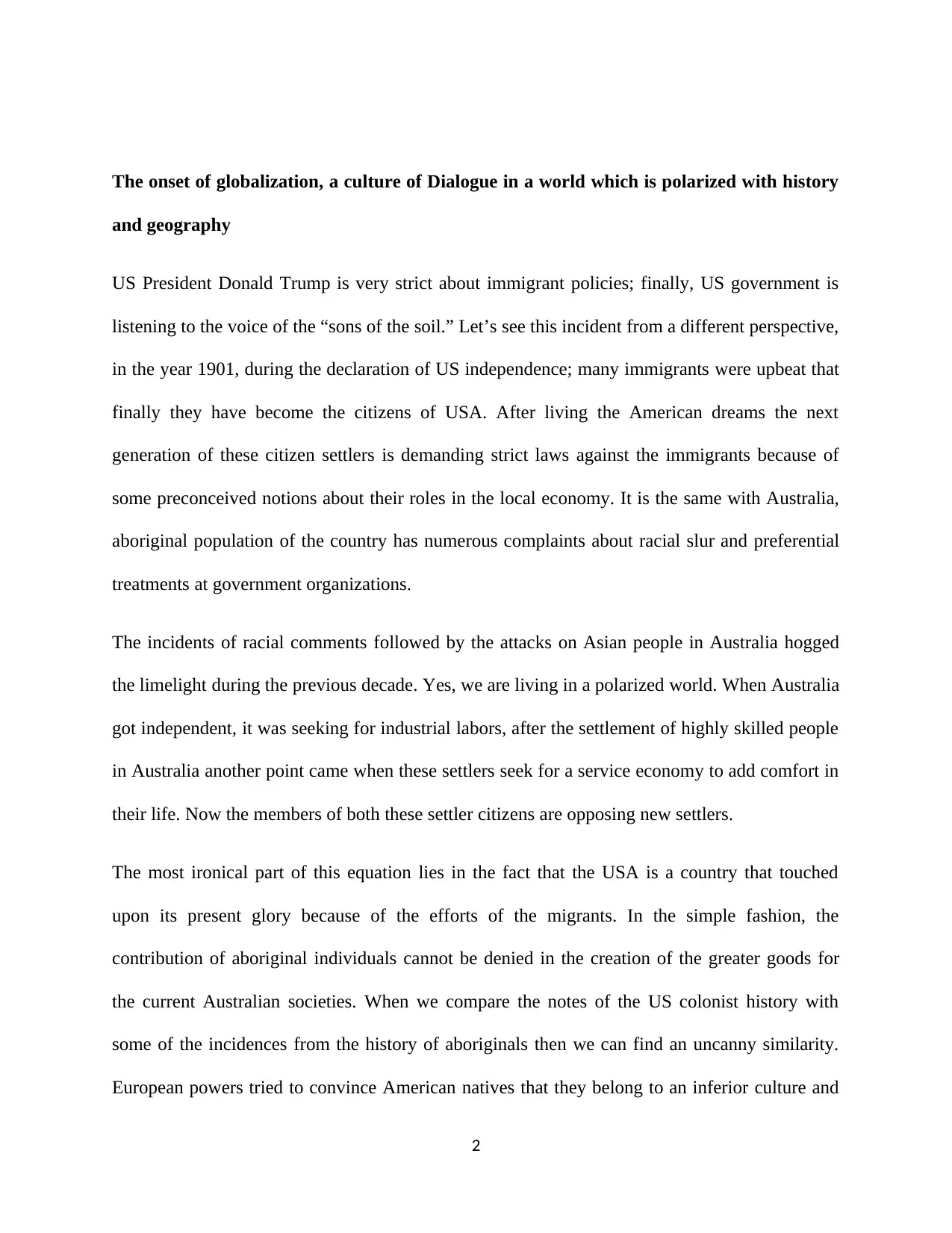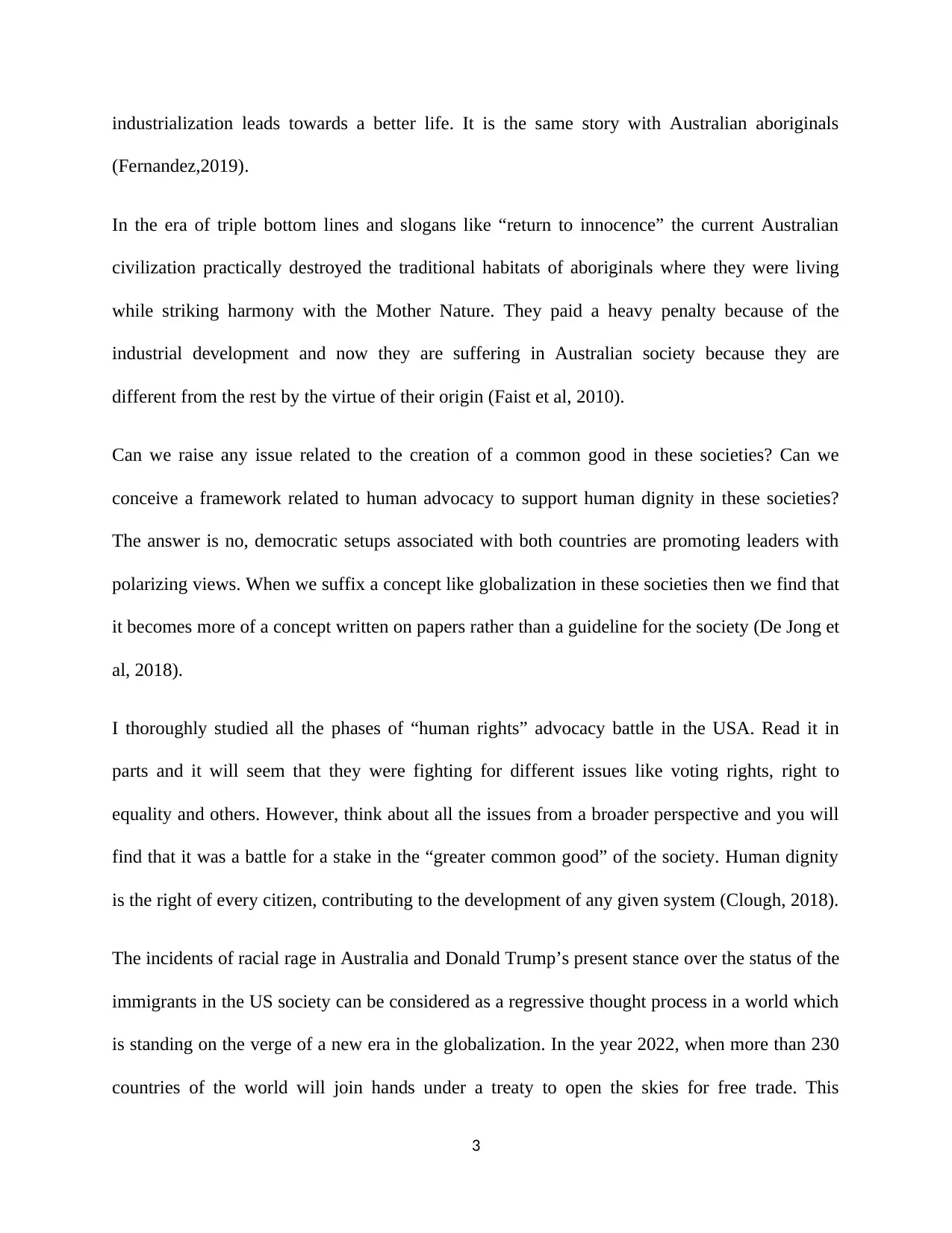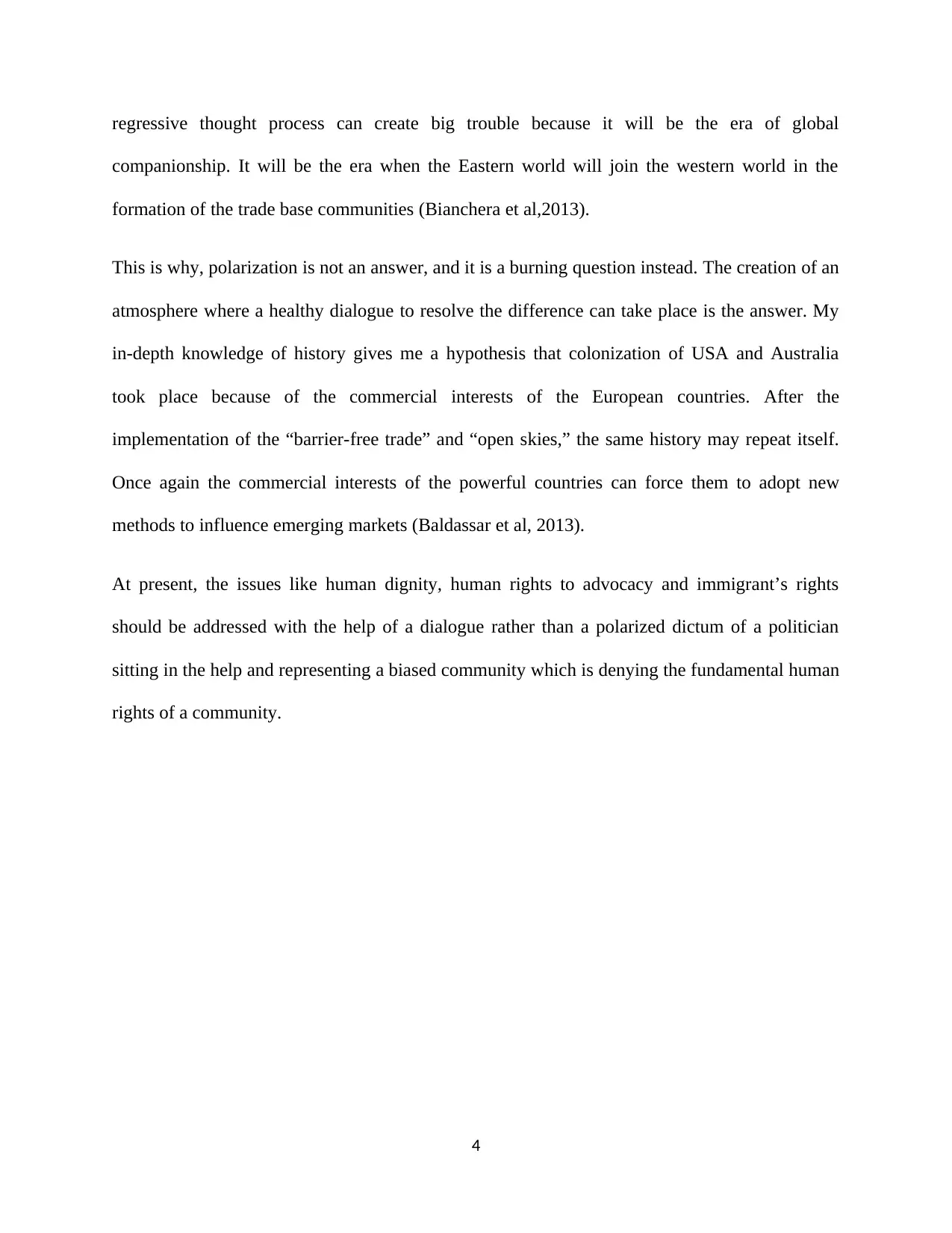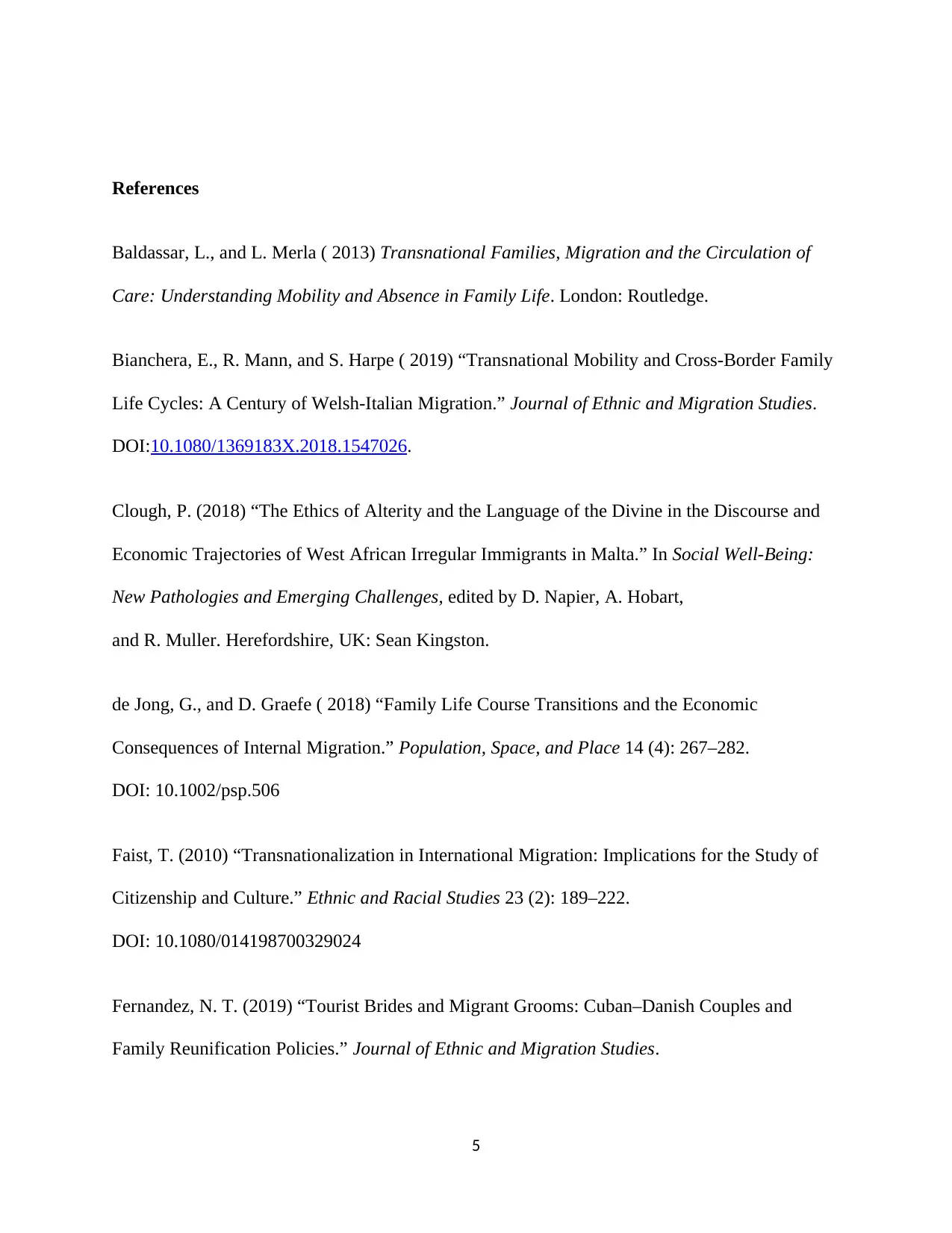Analyzing Common Good Challenges in a Globalized World - UNCC300
VerifiedAdded on 2022/10/17
|6
|1139
|136
Essay
AI Summary
This essay delves into the complexities of globalization, human rights, and the common good, using the US and Australian contexts to highlight the challenges of polarization and immigration policies. The author argues that the rise of regressive thought processes, fueled by commercial interests, threatens the progress towards a more just and equitable world. Drawing on historical analysis and contemporary issues, the essay emphasizes the importance of dialogue and advocacy to address issues of human dignity and rights. The essay critiques the current state of affairs, where leaders often promote polarizing views, and suggests that a focus on shared responsibility and the common good is essential for navigating the challenges of a globalized world. The author suggests that the historical context of colonization and the potential for similar patterns to emerge in the future, underscore the need for vigilance and proactive measures to protect human rights and promote inclusive societies.

1
Paraphrase This Document
Need a fresh take? Get an instant paraphrase of this document with our AI Paraphraser

The onset of globalization, a culture of Dialogue in a world which is polarized with history
and geography
US President Donald Trump is very strict about immigrant policies; finally, US government is
listening to the voice of the “sons of the soil.” Let’s see this incident from a different perspective,
in the year 1901, during the declaration of US independence; many immigrants were upbeat that
finally they have become the citizens of USA. After living the American dreams the next
generation of these citizen settlers is demanding strict laws against the immigrants because of
some preconceived notions about their roles in the local economy. It is the same with Australia,
aboriginal population of the country has numerous complaints about racial slur and preferential
treatments at government organizations.
The incidents of racial comments followed by the attacks on Asian people in Australia hogged
the limelight during the previous decade. Yes, we are living in a polarized world. When Australia
got independent, it was seeking for industrial labors, after the settlement of highly skilled people
in Australia another point came when these settlers seek for a service economy to add comfort in
their life. Now the members of both these settler citizens are opposing new settlers.
The most ironical part of this equation lies in the fact that the USA is a country that touched
upon its present glory because of the efforts of the migrants. In the simple fashion, the
contribution of aboriginal individuals cannot be denied in the creation of the greater goods for
the current Australian societies. When we compare the notes of the US colonist history with
some of the incidences from the history of aboriginals then we can find an uncanny similarity.
European powers tried to convince American natives that they belong to an inferior culture and
2
and geography
US President Donald Trump is very strict about immigrant policies; finally, US government is
listening to the voice of the “sons of the soil.” Let’s see this incident from a different perspective,
in the year 1901, during the declaration of US independence; many immigrants were upbeat that
finally they have become the citizens of USA. After living the American dreams the next
generation of these citizen settlers is demanding strict laws against the immigrants because of
some preconceived notions about their roles in the local economy. It is the same with Australia,
aboriginal population of the country has numerous complaints about racial slur and preferential
treatments at government organizations.
The incidents of racial comments followed by the attacks on Asian people in Australia hogged
the limelight during the previous decade. Yes, we are living in a polarized world. When Australia
got independent, it was seeking for industrial labors, after the settlement of highly skilled people
in Australia another point came when these settlers seek for a service economy to add comfort in
their life. Now the members of both these settler citizens are opposing new settlers.
The most ironical part of this equation lies in the fact that the USA is a country that touched
upon its present glory because of the efforts of the migrants. In the simple fashion, the
contribution of aboriginal individuals cannot be denied in the creation of the greater goods for
the current Australian societies. When we compare the notes of the US colonist history with
some of the incidences from the history of aboriginals then we can find an uncanny similarity.
European powers tried to convince American natives that they belong to an inferior culture and
2

industrialization leads towards a better life. It is the same story with Australian aboriginals
(Fernandez,2019).
In the era of triple bottom lines and slogans like “return to innocence” the current Australian
civilization practically destroyed the traditional habitats of aboriginals where they were living
while striking harmony with the Mother Nature. They paid a heavy penalty because of the
industrial development and now they are suffering in Australian society because they are
different from the rest by the virtue of their origin (Faist et al, 2010).
Can we raise any issue related to the creation of a common good in these societies? Can we
conceive a framework related to human advocacy to support human dignity in these societies?
The answer is no, democratic setups associated with both countries are promoting leaders with
polarizing views. When we suffix a concept like globalization in these societies then we find that
it becomes more of a concept written on papers rather than a guideline for the society (De Jong et
al, 2018).
I thoroughly studied all the phases of “human rights” advocacy battle in the USA. Read it in
parts and it will seem that they were fighting for different issues like voting rights, right to
equality and others. However, think about all the issues from a broader perspective and you will
find that it was a battle for a stake in the “greater common good” of the society. Human dignity
is the right of every citizen, contributing to the development of any given system (Clough, 2018).
The incidents of racial rage in Australia and Donald Trump’s present stance over the status of the
immigrants in the US society can be considered as a regressive thought process in a world which
is standing on the verge of a new era in the globalization. In the year 2022, when more than 230
countries of the world will join hands under a treaty to open the skies for free trade. This
3
(Fernandez,2019).
In the era of triple bottom lines and slogans like “return to innocence” the current Australian
civilization practically destroyed the traditional habitats of aboriginals where they were living
while striking harmony with the Mother Nature. They paid a heavy penalty because of the
industrial development and now they are suffering in Australian society because they are
different from the rest by the virtue of their origin (Faist et al, 2010).
Can we raise any issue related to the creation of a common good in these societies? Can we
conceive a framework related to human advocacy to support human dignity in these societies?
The answer is no, democratic setups associated with both countries are promoting leaders with
polarizing views. When we suffix a concept like globalization in these societies then we find that
it becomes more of a concept written on papers rather than a guideline for the society (De Jong et
al, 2018).
I thoroughly studied all the phases of “human rights” advocacy battle in the USA. Read it in
parts and it will seem that they were fighting for different issues like voting rights, right to
equality and others. However, think about all the issues from a broader perspective and you will
find that it was a battle for a stake in the “greater common good” of the society. Human dignity
is the right of every citizen, contributing to the development of any given system (Clough, 2018).
The incidents of racial rage in Australia and Donald Trump’s present stance over the status of the
immigrants in the US society can be considered as a regressive thought process in a world which
is standing on the verge of a new era in the globalization. In the year 2022, when more than 230
countries of the world will join hands under a treaty to open the skies for free trade. This
3
⊘ This is a preview!⊘
Do you want full access?
Subscribe today to unlock all pages.

Trusted by 1+ million students worldwide

regressive thought process can create big trouble because it will be the era of global
companionship. It will be the era when the Eastern world will join the western world in the
formation of the trade base communities (Bianchera et al,2013).
This is why, polarization is not an answer, and it is a burning question instead. The creation of an
atmosphere where a healthy dialogue to resolve the difference can take place is the answer. My
in-depth knowledge of history gives me a hypothesis that colonization of USA and Australia
took place because of the commercial interests of the European countries. After the
implementation of the “barrier-free trade” and “open skies,” the same history may repeat itself.
Once again the commercial interests of the powerful countries can force them to adopt new
methods to influence emerging markets (Baldassar et al, 2013).
At present, the issues like human dignity, human rights to advocacy and immigrant’s rights
should be addressed with the help of a dialogue rather than a polarized dictum of a politician
sitting in the help and representing a biased community which is denying the fundamental human
rights of a community.
4
companionship. It will be the era when the Eastern world will join the western world in the
formation of the trade base communities (Bianchera et al,2013).
This is why, polarization is not an answer, and it is a burning question instead. The creation of an
atmosphere where a healthy dialogue to resolve the difference can take place is the answer. My
in-depth knowledge of history gives me a hypothesis that colonization of USA and Australia
took place because of the commercial interests of the European countries. After the
implementation of the “barrier-free trade” and “open skies,” the same history may repeat itself.
Once again the commercial interests of the powerful countries can force them to adopt new
methods to influence emerging markets (Baldassar et al, 2013).
At present, the issues like human dignity, human rights to advocacy and immigrant’s rights
should be addressed with the help of a dialogue rather than a polarized dictum of a politician
sitting in the help and representing a biased community which is denying the fundamental human
rights of a community.
4
Paraphrase This Document
Need a fresh take? Get an instant paraphrase of this document with our AI Paraphraser

References
Baldassar, L., and L. Merla ( 2013) Transnational Families, Migration and the Circulation of
Care: Understanding Mobility and Absence in Family Life. London: Routledge.
Bianchera, E., R. Mann, and S. Harpe ( 2019) “Transnational Mobility and Cross-Border Family
Life Cycles: A Century of Welsh-Italian Migration.” Journal of Ethnic and Migration Studies.
DOI:10.1080/1369183X.2018.1547026.
Clough, P. (2018) “The Ethics of Alterity and the Language of the Divine in the Discourse and
Economic Trajectories of West African Irregular Immigrants in Malta.” In Social Well-Being:
New Pathologies and Emerging Challenges, edited by D. Napier, A. Hobart,
and R. Muller. Herefordshire, UK: Sean Kingston.
de Jong, G., and D. Graefe ( 2018) “Family Life Course Transitions and the Economic
Consequences of Internal Migration.” Population, Space, and Place 14 (4): 267–282.
DOI: 10.1002/psp.506
Faist, T. (2010) “Transnationalization in International Migration: Implications for the Study of
Citizenship and Culture.” Ethnic and Racial Studies 23 (2): 189–222.
DOI: 10.1080/014198700329024
Fernandez, N. T. (2019) “Tourist Brides and Migrant Grooms: Cuban–Danish Couples and
Family Reunification Policies.” Journal of Ethnic and Migration Studies.
5
Baldassar, L., and L. Merla ( 2013) Transnational Families, Migration and the Circulation of
Care: Understanding Mobility and Absence in Family Life. London: Routledge.
Bianchera, E., R. Mann, and S. Harpe ( 2019) “Transnational Mobility and Cross-Border Family
Life Cycles: A Century of Welsh-Italian Migration.” Journal of Ethnic and Migration Studies.
DOI:10.1080/1369183X.2018.1547026.
Clough, P. (2018) “The Ethics of Alterity and the Language of the Divine in the Discourse and
Economic Trajectories of West African Irregular Immigrants in Malta.” In Social Well-Being:
New Pathologies and Emerging Challenges, edited by D. Napier, A. Hobart,
and R. Muller. Herefordshire, UK: Sean Kingston.
de Jong, G., and D. Graefe ( 2018) “Family Life Course Transitions and the Economic
Consequences of Internal Migration.” Population, Space, and Place 14 (4): 267–282.
DOI: 10.1002/psp.506
Faist, T. (2010) “Transnationalization in International Migration: Implications for the Study of
Citizenship and Culture.” Ethnic and Racial Studies 23 (2): 189–222.
DOI: 10.1080/014198700329024
Fernandez, N. T. (2019) “Tourist Brides and Migrant Grooms: Cuban–Danish Couples and
Family Reunification Policies.” Journal of Ethnic and Migration Studies.
5

6
⊘ This is a preview!⊘
Do you want full access?
Subscribe today to unlock all pages.

Trusted by 1+ million students worldwide
1 out of 6
Related Documents
Your All-in-One AI-Powered Toolkit for Academic Success.
+13062052269
info@desklib.com
Available 24*7 on WhatsApp / Email
![[object Object]](/_next/static/media/star-bottom.7253800d.svg)
Unlock your academic potential
© 2024 | Zucol Services PVT LTD | All rights reserved.





